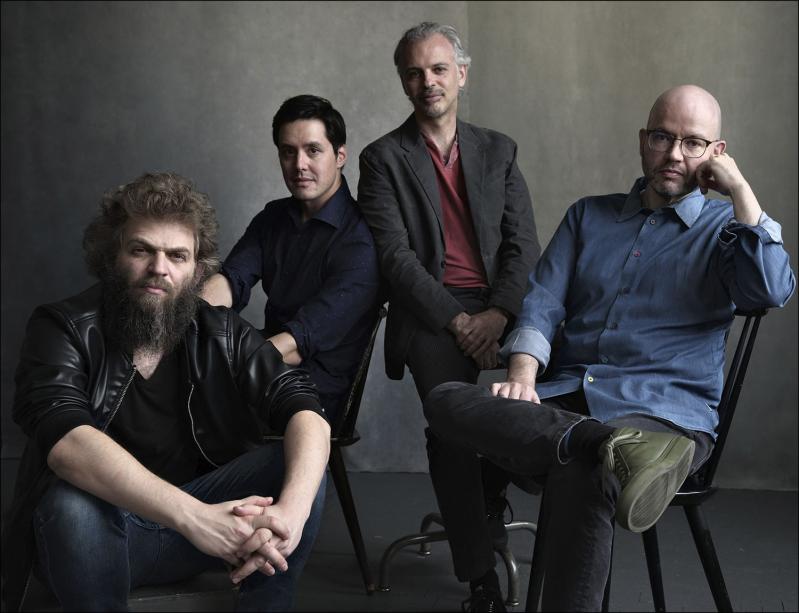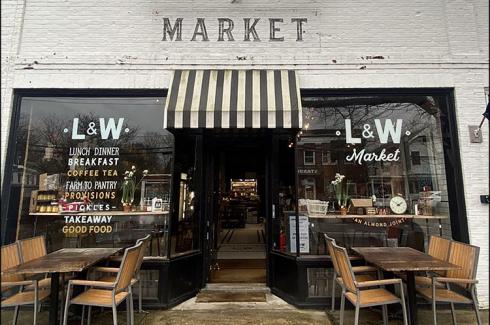Bridgehampton Chamber Music will stage three programs in three months for its autumn series: the adventurous Brooklyn Rider string quartet, the audience favorite Gilles Vonsattel in an all-Beethoven piano recital, and the ever-popular “Festive Baroque” holiday concert.
Brooklyn Rider’s program on Saturday is part of the Citizenship Notes project, an example of the quartet’s thinking outside the box that has brought them great acclaim. Colin Jacobsen, a violinist in the group, said last week that the upcoming 250th anniversary of the Declaration of Independence was on their minds when they developed this project. The string quartet, he said, “is an emblem of radical democracy, because you really have four individuals, both in the moment of music-making, passing the torch back and forth in terms of roles, and also in the rehearsal room.”
“We put Haydn and Beethoven at the center of this, because the time that the string quartet form was coming into existence was the time of the birth of the modern Western democracies. And you see that mirrored in the work of Haydn and Beethoven; so they are speaking to their time but also pushing it forward.”
At the beginning of the concert is Haydn’s String Quartet in F minor, from his Opus 20 of 1772, generally regarded as a milestone that defined the medium for the next 200 years. Closing the concert will be Beethoven’s String Quartet in C, Op. 59, sometimes nicknamed “Eroica” because of its heroic final movement. Both quartets end with a fugue. “In a certain sense the fugue is the ultimate flattened hierarchy, where all of the voices are completely integral to the whole,” Mr. Jacobsen said.
Between these large bookends are an avant-garde piece and a new arrangement of a popular 1960s song. Matana Roberts, a multidisciplinary artist, composer, and sound experimentalist, composed “borderlands” in 2018, about the U.S.-Mexico border crisis. It is not written as a traditionally notated musical score, Mr. Jacobsen said, but the score looks “almost like an Abstract Expressionist work.”
The players use timers to do certain things at certain times according to instructions written in the score, and there are some strict frameworks but there are also elements of chance, and dice are used as well. Each performance of the work is different, so this hearing of “borderlands” will truly be a one-of-a-kind experience.
Bob Dylan’s iconic popular song “The Times They Are a-Changin’ “ will be heard in a new arrangement for string quartet by Mr. Jacobsen. “When you do an instrumental arrangement of a piece that has words, a familiar song, you have to figure out how to make that alive, in terms of meaning without words,” he said. “And so I treated it as a theme and variations in which I was trying to depict the poetry of each stanza.”
The name Brooklyn Rider is derived from the German Expressionist group of the early 20th century known as Der Blaue Reiter, meaning “the Blue Rider,” which was a motif in the work of the artist Wassily Kandinsky. In addition to visual artists, the group also drew in musicians such as Arnold Schoenberg. Mr. Jacobsen said that the quartet, which started in Brooklyn 20 years ago, “loved their eclectic sense of artistic inspiration, moving art into the future, with a cross-disciplinary idea of it.”
On Nov. 15, Mr. Vonsattel, a pianist who has been called “immensely talented” by The New York Times and has appeared often with the festival, will perform two contrasting Beethoven sonatas. Marya Martin, the founder and artistic director of Bridgehampton Chamber Music, said last week that Mr. Vonsattel “is on a mission to play and record all 32 of Beethoven’s piano sonatas, which is a huge undertaking.”
The concert will start with his first piano sonata, which is in the style of Mozart. This will be paired with his Sonata No. 29 in B flat, usually referred to as the “Hammerklavier” sonata. At a time of national pride, Beethoven started to use the German neologism Hammerklavier rather than the Italian word for piano.
With a performance time of 40 to 45 minutes, this is one of the master’s boldest and longest piano sonatas, and scholars consider it a pivotal and transitional work between his third period and late period. It is also among the most challenging works in all of the classical piano literature, both technically and in interpretation. Add to all of that the poignant fact that Beethoven “was really having trouble with his hearing” when he was composing it, Ms. Martin said.
The holiday “Festive Baroque” concert, which has become a regular feature of the autumn series, will take place on Dec. 13. The ensemble will be made up of Ms. Martin on flute, Kristin Lee and Kevin Zhu on violin, Estelle Choi on cello, and Kenneth Weiss on harpsichord. They will be featured in various combinations in playing the music of Telemann, Lully, and Corelli.
A less well-known French composer, Louis-Gabriel Guillemain, will be heard in one of his Sonates en Quatuors. The program ends with Handel’s Water Music Suite No. 3, which, Ms. Martin said, will engage the audience with welcome familiarity and delight, beginning with the first three notes.
In these uncertain times, she added, “if I can provide some sort of solace, some sort of spiritual happiness, for a couple of hours -- that’s my job.”
Each Saturday concert is at the Bridgehampton Presbyterian Church at 5 p.m. Tickets are $75 or $50, $10 for students, available at bcmf.org or 212-741-9403.




